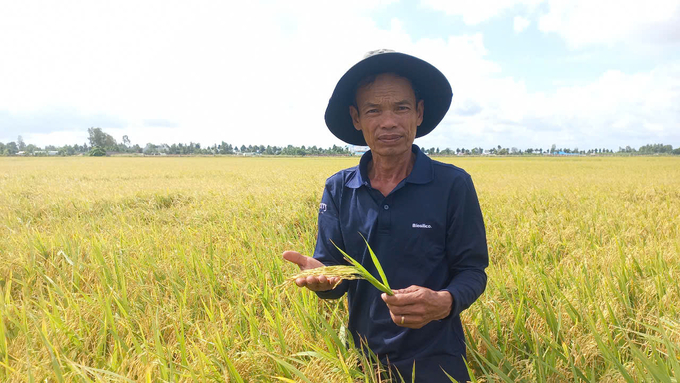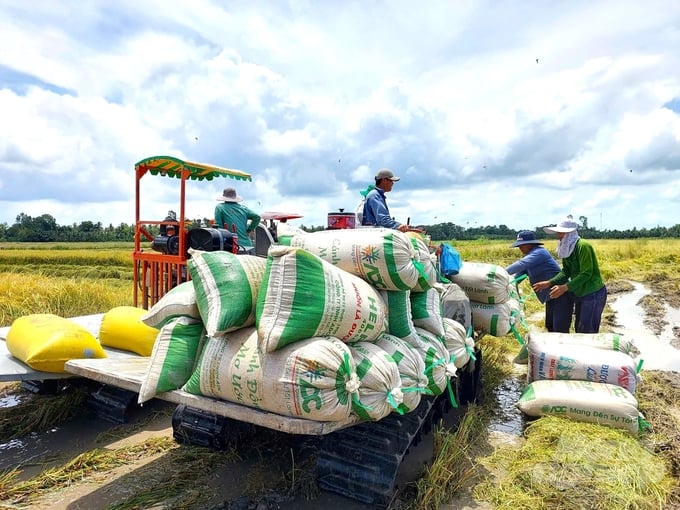May 16, 2025 | 10:03 GMT +7
May 16, 2025 | 10:03 GMT +7
Hotline: 0913.378.918
May 16, 2025 | 10:03 GMT +7
Hotline: 0913.378.918
Hau Giang Province's Department of Agriculture and Rural Development, in coordination with the local Department of Science and Technology and several rice farming cooperatives and businesses, recently concluded the implementation of a closed-loop rice farming model titled "producing cleaner, greener rice with high yields, in combination with measuring greenhouse gas emission reductions" (hereinafter referred to as the model).
The model utilizes the Ecocycle farming process developed by Net Zero Carbon Joint Stock Company, in collaboration with BSB Nanotech Joint Stock Company and MTK Huu Thanh Joint Stock Company.

Farmers participating in the low-emission rice production model featuring the Ecocycle process enjoyed higher yields and profits from the autumn-winter crop compared to the control field. Photo: Kim Anh.
Accordingly, Hau Giang Province implemented the model on an 18-hectare field in Truong Long Tay Commune, Chau Thanh A District during the 2024 autumn-winter crop. The adjacent control field spanned 9 hectares; both of the fields utilized the OM5451 rice variety. The model followed a smart rice cultivation process, incorporating the alternate wetting and drying (AWD) irrigation technique.
Additionally, participants of the project monitor and manage the entire rice growth process using a satellite technology provided by Spiro Carbon Group INC.
After nearly 100 days of implementation, both the model and control fields produced relatively positive results. Accordingly, rice yield in the model reached over 7.4 tons per hectare, an increase of more than 1 ton per hectare compared to the control field and an increase of 1.2 tons per hectare compared to the average yield in Truong Long Tay Commune.
In terms of investment costs, the model field saved 2.8 million VND per hectare compared to the control field. Notably, seed costs reduced by 780,000 VND per hectare, fertilizer costs by 740,000 VND per hectare, and pesticide costs by 1.3 VND million per hectare.
The model field yielded a net profit of 34.8 million VND per hectare for participating farmers, which is an increase of 11.1 million VND per hectare, nearly 47%, compared to the control field.

Hau Giang Province assessed that the low-emission rice farming model featuring the Ecocycle process has made a significant impact on the local agricultural sector. Photo: Kim Anh.
Ultimately, the application of the Ecocycle farming process has enabled farmers to reduce pesticide costs by 30% and chemical fertilizer usage by 15%. Additionally, the amount of rice seed used has decreased from from 120 kilograms per hectare to 80 kilograms per hectare.
Ngo Minh Long, Director of the Hau Giang Province's Department of Agriculture and Rural Development, highlighted the low-emission rice production model as an outstanding example of agricultural innovation in the province.
Despite its implementation in the autumn-winter crop, the model achieved 10 to 20% higher yields and profits compared to farmers' control fields. With these promising results, Hau Giang Province plans to continue inviting businesses and organizations with innovative, effective approaches to collaborate in implementing low-emission rice production during the 2024-2025 winter-spring crop. The province aims to reach a total of nearly 16,000 hectares of low-emission rice production area, as registered with the Ministry of Agriculture and Rural Development.

Hau Giang Province seeks continued collaboration from relevant organizations, agencies, and businesses in developing low-emission rice production models. Photo: Kim Anh.
According to Director Ngo Minh Long, Hau Giang Province is currently focusing on the decisive implementation of the "Sustainable Development Project for one million hectares of specialized, low-emission, high-quality rice in association with green growth in the Mekong Delta region by 2030." Additionally, the local Department of Agriculture and Rural Development has partnered with several relevant agencies to implement pilot models covering approximately 50 hectares for the 2024 autumn-winter crop, with initial positive results.
Director Ngo Minh Long acknowledged the business community's enthusiam in collaborating with local governments to implement low-emission rice farming models following the Ministry of Agriculture and Rural Development’s launch of the "Sustainable Development Project for one million hectares of specialized, low-emission, high-quality rice in association with green growth in the Mekong Delta region by 2030."
However, the scale and integration of these models require further improvement. Additionally, stakeholders must address numerous policy and regulatory issues to improve the models and methods.
In early October 2024, Hau Giang Province's Department of Agriculture and Rural Development plans to host a conference for local businesses, organizations, and stakeholders. Accordingly, participants of the event will have the opportunity to discuss and propose policies. This initiative will guide the province’s strategies for the 2024-2025 winter-spring crop and other future crops.
Translated by Nguyen Hai Long

(VAN) Cold-barn systems efficiently manage environmental and temperature conditions, which aids in the prevention of respiratory diseases in pigs and protects them from the vectors that transmit African swine fevers.

(VAN) To tackle challenges, the project 'Addressing key technical bottlenecks in the grouper supply chain in Vietnam' has been underway since 2024.

(VAN) The project 'Disease-Resilient and Sustainable Cassava Production Systems in the Mekong Region', funded by the Australian Center for International Agricultural Research (ACIAR), is being implemented from 2024 to 2028.

(VAN) Data from 10,000 farming households will help professionalize production organization and support the implementation of the One Million Hectares Program for High-Quality, Low-Emission Rice Cultivation.

(VAN) FAO Director-General QU Dongyu marks International Day of Plant Health at NENA conference.

(VAN) Deputy Minister of Agriculture and Environment Hoang Trung affirmed that floriculture and ornamental plants are a growing industry that receives significant global attention.

(VAN) The three staple crops dominating modern diets – corn, rice and wheat – are familiar to Americans. However, fourth place is held by a dark horse: cassava.